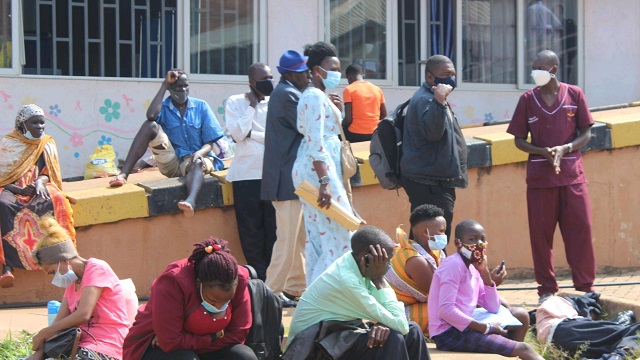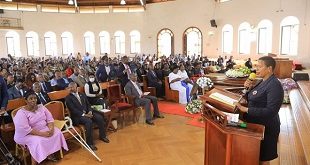
Kampala, Uganda | THE INDEPENDENT | The Uganda Cancer Institute based at Mulago National Referral hospital is known for offering a comprehensive package of cancer treatment and care services. The institute provides oncology services, chemotherapy, radiation therapy, surgery, cancer screening among a range of others.
The institute sees an unrelenting stream of patients every day. A large number of these patients come from far away villages and towns and do not have enough savings at their disposal. As a result, some of these outpatients and their families have to live and sleep in the cold on hospital verandas like security guards.
With blankets, mats and worn-out mattresses, these patients spend cold nights on pavements waiting for a doctor’s appointment or some test results.
When the alarm rings in the morning and it’s still pitch dark and cold outside, many of us find it hard to get out of bed. When it is raining, many will not get out in rain but this is what cancer patients have to endure each day and night at the Uganda Cancer Institute.
Jennifer Nabaasa works at the Uganda Cancer Institute as a resource navigator. One of the depressing scenes during her daily routine is seeing patients going to bed on the verandas and waking up in the morning just on time to allow cleaners to clean the places.
She told URN that it is common to have patients sleep on the verandas for weeks or months because they have travelled from upcountry and they don’t have relatives to stay with while on treatment.
“So you find someone sleeping on the veranda while on cancer treatment. And that cancer treatment the way it is strong while on treatment let’s say chemotherapy, you find somebody is weak, somebody is vomiting, all that but the person is sleeping on the veranda,” said Nabaasa
One’s eye cannot miss patients of all gender- women, girls, boys, men and the elderly as he/she approaches Uganda Cancer Institute from either side. Some can be seen resting on benches which they have turned into beds, others are seen sleeping on the floors. It is common to find one patent being supported by one or two caregivers who equally endure the cold in the night, the rainy and sunny days.
And besides the lack of shelter, they don’t have clean drinking water, yet they have to fight over congested bathrooms and places of convenience. Jennifer Nabaasa says because these are outpatients, the day and night meal served at Uganda Cancer Institute is not for them too.
A person visiting the cancer institute for the first time will find the entire environment quite depressing. One may be tempted to blame the Uganda Cancer Institute until they get explained to. But usually, the patient will have received the treatment and given an appointment on when to visit. The problem is that patients choose to stay in order to cut costs.
At one of the congested verandas sits Edilu Denis. He is one of the caregivers looking after his sick uncle. By the time URN visited the institute, Edilu had secured an appointment to meet a consultant on 22nd March. That is to say, he had thirteen days to the appointment but he, another caregiver and their patient have chosen to stay here instead of travelling to Serere in Eastern Uganda.
Denis shares his bed, a few sheets of thin white foam on the concrete floor with the patient surrounded by other patients going through different stages of cancer treatment as he explains why they opt to sleep in the cold.
“It is just because we don’t have again any place to sleep. All the wards are occupied. Even our patients don’t sleep inside. It is not only us who sleep outside. Just because places of sleeping are not there” explains Edilu.
Edilu says unlike the past, the cost of public transport has been hiked yet the patient must visit the cancer institute as per the appointed days.
Besides the high number of patients that report to the cancer institute on a dial basis, informal caregivers like Denis Edilu add to the congestion. The severe deficit of health care workers in Uganda necessitates hospitalized patients to be cared for by a relative. Although studies have been conducted on challenges facing informal caregivers in the home setting, no study has addressed the caregiver burden in the hospital setting like at Uganda cancer institute.
The Uganda Cancer Institute Executive Director Jackson Orem explained that the while concern over lack of a patient shelter needs to be addressed, the permanent solution would be the construction of so rot a hotel to accommodate patients that come from far. “We must have a good place where patients can stay. Most important is for us to have a hostel or hostels where these patients stay,” he said.
Uganda Cancer Society Executive Director Paul Ebusu said the concern about patients spending nights in the cold has serious humanitarian and human rights implication. He suggested that individual Ugandans, philanthropies ad members of society need to find a solution.
******
URN
 The Independent Uganda: You get the Truth we Pay the Price
The Independent Uganda: You get the Truth we Pay the Price


